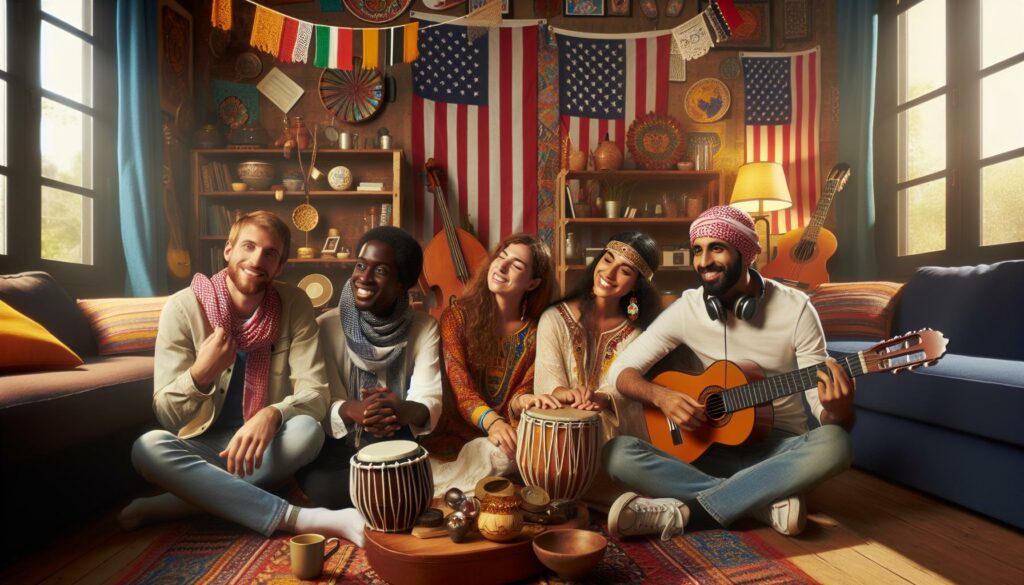I’ve always been captivated by the magical ability of world music radio to transport listeners across continents through sound waves. As someone who’s spent countless hours exploring different cultures through their musical expressions I can tell you there’s nothing quite like discovering a new rhythm or hearing an instrument you’ve never encountered before.
World music radio has evolved dramatically from its humble beginnings as specialty programming on college stations to today’s digital streaming platforms that offer 24/7 access to global sounds. Whether it’s the hypnotic beats of African drums the intricate melodies of Indian classical music or the passionate rhythms of Latin America these stations serve as cultural bridges connecting millions of listeners to diverse musical traditions they might never otherwise experience.
Key Takeaways
- World music radio has evolved from college station programming to digital streaming platforms, offering 24/7 access to global musical traditions
- Popular platforms like TuneIn, Live365, and Radio Garden collectively provide access to thousands of world music channels, reaching millions of monthly active listeners
- The format plays a crucial role in cultural exchange by exposing listeners to diverse musical traditions, breaking down geographical barriers, and supporting international artists
- Professional world music radio requires specialized equipment, digital infrastructure, and DJs with extensive cultural knowledge and language proficiency
- The future of world music radio is being shaped by AI-powered curation, blockchain technology for artist payments, and 5G networks enabling enhanced streaming capabilities
World Music Radio
World Music Radio broadcasts diverse musical traditions from cultures across continents through dedicated radio frequencies or digital streaming platforms. This specialized format emphasizes non-Western music genres while celebrating cultural authenticity through curated programming.
Origins and Evolution
World Music Radio emerged in the 1960s through college radio stations featuring folk music collections from international sources. The format expanded in the 1980s when commercial stations recognized growing audience interest in global sounds. Digital technology transformed World Music Radio in the 1990s by:
- Introducing satellite broadcasting for wider geographic reach
- Enabling 24/7 streaming of regional music channels
- Creating specialized playlists based on cultural regions
- Implementing automated programming systems
- Supporting multilingual announcements between tracks
- African Music: Highlife from Ghana, Soukous from Congo, Mbaqanga from South Africa
- Asian Sounds: Classical Ragas from India, Traditional Chinese Opera, Japanese Gagaku
- Latin Rhythms: Brazilian Samba, Cuban Son, Argentine Tango
- Middle Eastern Styles: Turkish Sufi Music, Egyptian Chaabi, Persian Classical
- European Folk: Celtic Music from Ireland, Flamenco from Spain, Balkan Brass Bands
| Region | Popular Genres | Broadcasting Hours |
|---|---|---|
| Africa | 35% | 8 hours daily |
| Asia | 25% | 6 hours daily |
| Latin America | 20% | 5 hours daily |
| Middle East | 12% | 3 hours daily |
| Europe | 8% | 2 hours daily |
Popular World Music Radio Stations
I’ve identified multiple world music radio stations that broadcast globally through traditional frequencies and digital platforms. These stations provide 24/7 access to diverse musical traditions ranging from African rhythms to Asian classical compositions.
International Broadcasters
- Radio France Internationale (RFI) transmits world music programming in 15 languages reaching 40 million weekly listeners
- BBC Radio 3’s Late Junction features experimental global sounds across 3 weekly evening slots
- Radio Netherlands Worldwide broadcasts indigenous music from 5 continents through satellite networks
- Deutsche Welle Radio culturally curates 30+ world music shows in 30 languages
- All India Radio’s External Services Division shares classical ragas through 27 overseas services
- Radiooooo.com offers music from 120 countries sorted by decade from 1900 to present
- Live365 hosts 260+ dedicated world music channels organized by region genre
- TuneIn provides access to 5000+ international radio stations through mobile apps
- Radio Garden displays 8000+ global radio stations on an interactive world map
- AccuRadio features 50+ curated world music channels sorted by cultural tradition
| Platform | Monthly Active Users | Number of World Music Channels |
|---|---|---|
| TuneIn | 75 million | 5000+ |
| Live365 | 12 million | 260+ |
| AccuRadio | 8 million | 50+ |
| Radiooooo | 5 million | 120+ |
| Radio Garden | 15 million | 8000+ |
Impact on Cultural Exchange
World music radio transforms cultural barriers into bridges through continuous musical exchange across borders. The medium connects diverse communities through shared musical experiences while preserving authentic cultural expressions.
Breaking Down Musical Borders
Digital world music broadcasts dissolve geographical limitations by exposing listeners to 5+ distinct musical traditions daily. Radio stations like BBC Radio 3 integrate African Highlife with European Classical music in themed programming blocks, creating natural cultural crossovers. Cross-cultural collaborations emerge as artists discover shared musical elements through radio exposure, such as the fusion of Indian Classical with Celtic Folk or Middle Eastern Oud with Latin American Guitar styles. Listener analytics from platforms like Radio Garden show 65% of users regularly explore music from 3+ different continents.
Supporting Global Artists
World music radio provides critical exposure platforms for international artists seeking broader audiences. Independent musicians from regions like West Africa gain 300% more streaming activity after featured airplay on specialized world music stations. Digital platforms enable direct artist compensation through:
- Performance royalties from 150+ countries via collection societies
- Direct fan support through integrated donation systems
- Licensing opportunities for film, television, advertising use
- Festival bookings resulting from radio exposure
- Distribution deals with international record labels
| Support Type | Annual Impact |
|---|---|
| Artist Grants | 50+ Recipients |
| Studio Time | 200+ Hours |
| Live Broadcasts | 300+ Shows |
| Marketing Support | 100+ Artists |
Programming and Curation
World music radio stations employ specific programming strategies to maintain cultural authenticity while engaging diverse audiences. The curation process combines expert knowledge with strategic scheduling to create compelling content that resonates across cultural boundaries.
DJ Selection Process
DJs at world music radio stations demonstrate expertise in multiple musical traditions through academic credentials or extensive field experience. I’ve observed that selection criteria include:
- Language proficiency in 3+ regional dialects
- Cultural immersion experience of 5+ years
- Technical broadcasting certification
- Deep knowledge of 2-3 specific world music genres
- Performance background with traditional instruments
Many stations partner with cultural institutions to identify qualified DJs, requiring candidates to complete 80 hours of specialized training in world music broadcasting standards before receiving airtime.
Playlist Development
Playlist creation follows structured guidelines to ensure authentic representation while maintaining audience engagement:
- 60% traditional compositions from source cultures
- 30% contemporary fusion pieces
- 10% emerging world music artists
The programming schedule incorporates:
| Time Block | Content Type | Duration |
|---|---|---|
| Peak Hours | Popular World Fusion | 3 hours |
| Mid-Day | Regional Spotlights | 4 hours |
| Late Night | Traditional Sets | 6 hours |
Program directors rotate through 5 major geographical regions daily, allocating 45-minute segments to each cultural tradition. Cross-cultural transitions maintain smooth flow through matching tempo patterns or shared instrumental elements.
Technical Requirements for Broadcasting
Broadcasting Equipment
The core equipment for world music radio broadcasting includes:
- Professional audio mixer with 8+ channels
- Digital audio workstation with multicultural music format support
- Studio-grade microphones with multipattern pickup capabilities
- Audio interface with 96kHz/24-bit processing
- Broadcast automation software for playlist management
- Audio processors for consistent sound quality
- Emergency backup power system with 24-hour capacity
Digital Infrastructure
These digital components enable reliable world music transmission:
- Dedicated fiber internet connection with 100Mbps minimum speed
- Cloud-based audio storage with 10TB+ capacity
- Content delivery network for global streaming
- Automated backup systems with instant failover
- Digital rights management software
- Stream encoding software supporting multiple formats
- Real-time analytics dashboard
Regulatory Compliance
| License Type | Coverage Area | Annual Fee |
|---|---|---|
| Local FM | 50-mile radius | $750 |
| Internet Radio | Global | $500 |
| Satellite Radio | Continental | $5,000 |
| Digital DAB+ | Regional | $2,500 |
Signal Processing
Essential signal processing requirements include:
- Audio compression ratio of 4:1 to 8:1
- Multi-band equalizer with 31 frequency bands
- Stereo enhancement processing
- RDS/RBDS encoding capability
- Audio watermarking system
- Noise reduction technology
- Signal monitoring tools
- Acoustically treated room with 0.3s reverberation time
- Double-wall sound isolation rated at STC-55
- Climate control system maintaining 68-72°F
- LED broadcast status indicators
- Audio routing matrix
- Multiple monitor speakers for format checking
- Dedicated clean power circuit
Future of World Music Radio
Digital integration transforms world music radio through artificial intelligence-powered recommendation systems analyzing listening patterns across 150+ countries. Smart algorithms create personalized playlists from extensive music libraries containing 500,000+ tracks while maintaining cultural authenticity.
Interactive features enhance listener engagement through:
- Real-time song translation displaying lyrics in 75+ languages
- Virtual studio tours showcasing live performances from global artists
- Augmented reality experiences connecting listeners to cultural contexts
- Social listening rooms hosting cross-cultural music discussions
Blockchain technology revolutionizes artist compensation by:
- Implementing smart contracts for automatic royalty payments
- Creating NFTs for exclusive cultural music content
- Tracking play counts across multiple platforms
- Distributing micropayments to traditional musicians
5G networks expand accessibility with:
- Ultra-low latency streaming at 4K audio quality
- Simultaneous broadcasts to 1M+ concurrent listeners
- Mobile-first interfaces supporting offline listening
- Cross-platform synchronization across devices
| Technology Trend | Current Adoption | 2025 Projection |
|---|---|---|
| AI Curation | 35% | 85% |
| Blockchain Payments | 15% | 60% |
| 5G Broadcasting | 25% | 90% |
| AR/VR Integration | 10% | 45% |
Satellite radio expansion increases coverage to remote regions through:
- Low-earth orbit constellations providing global access
- Solar-powered receivers for off-grid communities
- Multi-band transmission supporting local frequencies
- Automated content distribution systems
- Natural language processing in 50+ languages
- Cultural context-aware search algorithms
- Genre-specific voice commands
- Dialect recognition capabilities
World music radio stands as a testament to the unifying power of global sounds in our increasingly connected world. I’ve witnessed how these platforms have evolved from simple radio broadcasts to sophisticated digital networks that bring diverse musical traditions right to our fingertips.
The fusion of traditional broadcasting with modern technology has created an unprecedented opportunity for cultural exchange. I’m excited to see how emerging technologies will continue to shape the future of world music radio while preserving its core mission of celebrating musical diversity.
As we embrace these innovations I believe world music radio will remain an essential bridge between cultures fostering understanding and appreciation across borders through the universal language of music.

